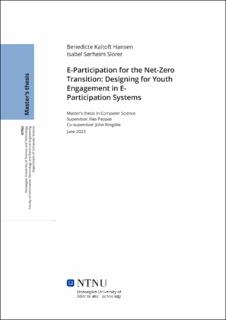| dc.contributor.advisor | Pappas, Ilias | |
| dc.contributor.advisor | Krogstie, John | |
| dc.contributor.author | Slorer, Isabel Sørheim | |
| dc.contributor.author | Hansen, Benedicte Kaltoft | |
| dc.date.accessioned | 2023-09-07T17:24:17Z | |
| dc.date.available | 2023-09-07T17:24:17Z | |
| dc.date.issued | 2023 | |
| dc.identifier | no.ntnu:inspera:142737689:35242230 | |
| dc.identifier.uri | https://hdl.handle.net/11250/3088033 | |
| dc.description.abstract | Klimaendringene har stadig mer omfattende globale konsekvenser, og det kreves umiddelbar handling for å oppnå målene fastsatt i Parisavtalen. For å begrense global oppvarming til 1,5 °C, må utslippene reduseres med 45% innen 2030 og nå netto null innen 2050. Den yngre befolkningen, som vil oppleve de største konsekvensene av klimaendringene, uttrykker frustrasjon over det de oppfatter som manglende handling fra politikere. Forskningsfeltet bærekraftig menneske-maskin-interaksjon (Sustainable HCI) har etterlyst design av digitale systemer som kan støtte transparent grønn politikk og fremme demokratier med engasjement for å støtte nødvendige systemendringer i samfunnet. I tillegg har digital styring og e-deltakelse stort potensial for å fremme transparente beslutningsprosesser og øke engasjement blant befolkningen. Likevel er det lite forskning på krysningen mellom e-deltakelse og bærekraftig menneske-maskin-interaksjon, til tross for potensialet digitale teknologier har til å bidra mot klimaendringene. Videre mangler det forskning på behovene til unge mennesker med begrenset erfaring innen samfunnsdeltakelse. Denne masteroppgaven adresserer disse manglene i forskningen og bidrar til inkluderende og informerte beslutningsprosesser som er nødvendige for å takle klimaendringene. For å gjøre dette, har masteroppgaven som mål å besvare følgende forskningsspørsmål:
- RQ1 Hvordan kan et e-deltakelsessystem for overgangen til netto null legge til rette for deltakelse og engasjement blant unge mennesker?
- RQ2 Hvordan kan et e-deltakelsessystem for overgangen til netto null bidra til meningsfulle innbyggerinnspill til statlige ansatte som utvikler klimapolitikk (government officials)?
For å besvare spørsmålene ble det benyttet en design science forskningsmetode, som legger vekt på utviklingen av en artefakt gjennom iterativ forbedring og brukertesting. Artefakten representerte en prototype av et e-deltakelsessystem spesifikt designet for å engasjere unge borgere. Tilbakemeldinger fra unge innbyggere og personer fra staten som jobber med klimapolitikk (government officials) ble samlet inn gjennom flere iterasjoner ved hjelp av semi-strukturerte intervjuer og demonstrasjoner av artefakten. De transkriberte intervjuene ble analysert ved hjelp av en tematisk analyse. Dette resulterte i fem designprinsipper og tre designforslag for e-deltakelsesystemer fokusert på klimapolitikk, med spesielt fokus på økt engasjement fra unge borgere samtidig som verdifullt innhold tilbys for beslutningstakere.
De viktigste bidragene inkluderer retningslinjer gjennom designprinsipper og designforslag for utvikling av e-deltakelsesystemer samt et bidrag til krysningen mellom forskningsfeltene for bærekraftig menneske-datamaskin-interaksjon og e-deltakelse. | |
| dc.description.abstract | Climate change is having increasingly widespread impacts on a global scale, requiring immediate action to achieve the objectives outlined in the Paris Agreement. To limit global warming to 1.5°C, emissions must be reduced by 45% by 2030 and reach net-zero by 2050. The younger population, who will experience the greatest consequences of climate change, expresses frustration due to the perceived lack of action from politicians. The research field of Sustainable Human-Computer Interaction has called for the design of digital systems that can support transparent green policies and foster engaged democracies, to support the necessary societal system changes. Additionally, Digital Governance and E-Participation hold great promise for facilitating transparent decision-making processes and enhancing citizen engagement. Nonetheless, there is little research investigating the intersection of e-participation and environmental sustainability, despite the potential of digital technologies to address climate change. Furthermore, understanding the specific needs of young citizens with limited experience in societal participation remains a critical research gap. This thesis seeks to address these gaps and contribute to inclusive and informed decision-making processes necessary for addressing the urgency of climate change. The thesis aims to answer the following research questions:
- RQ1 How can an e-participation system for the net-zero transition facilitate participation and engagement among young citizens?
- RQ2 How can an e-participation system for the net-zero transition facilitate meaningful citizen input to government officials?
To answer the research questions, a design science research approach was employed, emphasizing the creation of an artifact and its iterative refinement and user testing. The artifact represented a prototype e-participation system specifically designed to engage young citizens. Feedback from young citizens and government officials was collected through several iterations using semi-structured interviews and artifact demonstrations. The transcribed interviews were analyzed using a thematic analysis approach. The findings resulted in five design principles and three design propositions for e-participation systems focused on climate policy, specifically targeting increased engagement and participation from young citizens while providing valuable content for policymakers.
The key contributions include offering guidelines through design principles and design propositions, for the development of e-participation platforms, as well as contributing to the larger discussion on the intersection of Sustainable Human-Computer Interaction and E-Participation. | |
| dc.language | eng | |
| dc.publisher | NTNU | |
| dc.title | E-Participation for the Net-Zero Transition: Designing for Youth Engagement in E- Participation Systems | |
| dc.type | Master thesis | |
